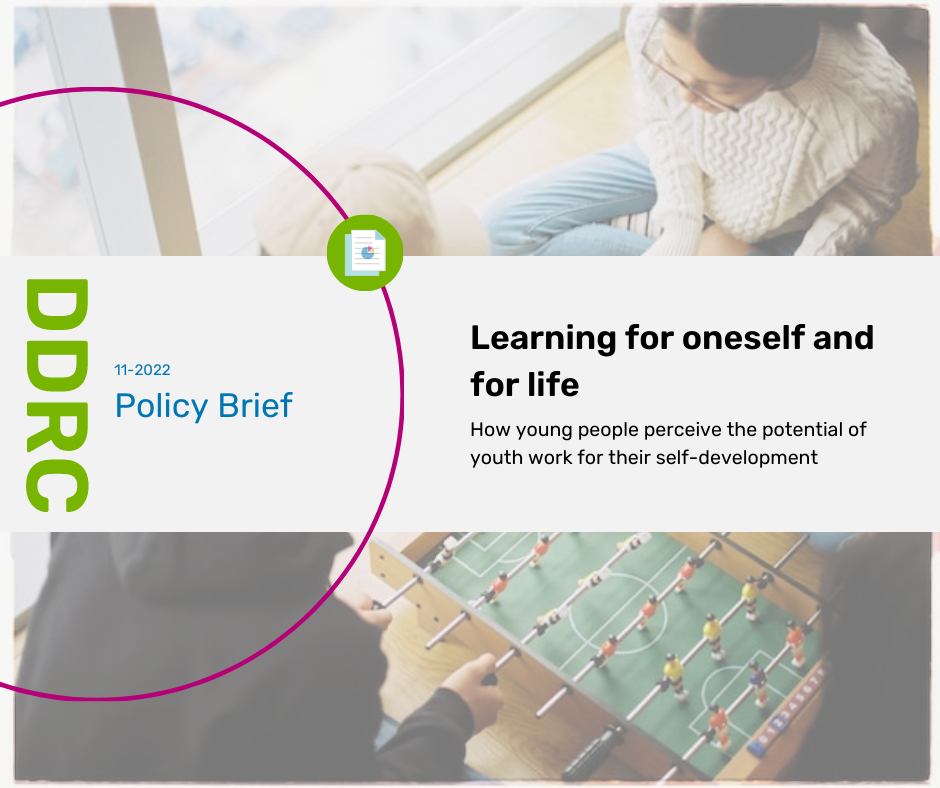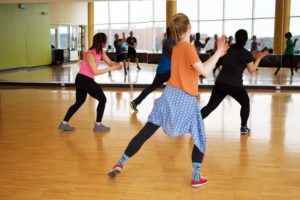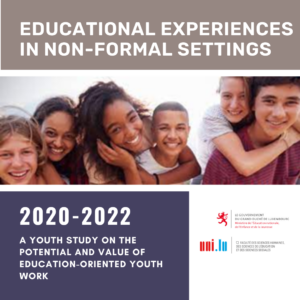An empirical study by the Centre for Childhood and Youth Research (CCY) at the University of Luxembourg investigated the educational experiences of young people in open youth work in Luxembourg. Open Youth Work is an exemplary domain of non-formal education, which is currently considered important alongside formal school education in Luxembourg when it comes to a more broadly oriented education of young people.
The study reveals that open youth work provides a wide range of conducive framework conditions for the self-education of young people. In doing so, it is oriented towards a holistic understanding of education, which does not focus on a measurable achievement, but on the development of young people’s self-determined ability to act. Where young people see the potential of youth work is what this policy brief describes.
Jump to content
Little research in education-oriented youth work
The study examines the question which educational experiences young people have in youth centers and what value they attach to these experiences for themselves and their future. It also examines how and through what young people and young adults educate themselves in open youth work and develop their personality, i.e.
- on the basis of which occasions,
- on which topics,
- under what conditions and
- and with what effects.
This is based on a theoretical understanding of education which is much more than the acquisition of knowledge or new competences. Rather, education is understood in a comprehensive way as subject education (Scherr, 2021).
This means that young people are seen as independent members and shapers of their life situation and society, which they learn to understand and from which they (should) confidently come to their own ways of thinking and acting as well as making decisions.
Following Wilhelm von Humboldt’s classical concept of education, a transformative understanding of education (Koller, 2018) is also expressed in this context:
Educational processes occur when a person emerges changed from an experience and has thus gained new perspectives on oneself and on the world.
Open youth work in particular, with its voluntary services, is considered to have a lot to offer when it comes to supporting the education of young people as subjects and the development of their personality.
However, whether and how it succeeds in doing so has not yet been sufficiently researched in Luxembourg. In particular, little is known about how young people perceive educational processes and opportunities in youth work.
Tailor-made research approach for complex educational processes
In order to investigate this scientifically, seven Luxembourgish youth centers were selected which differ in terms of certain characteristics (e.g. location of the youth center, target group, structure of participants).
Since educational processes in youth work can be quite complex, qualitative and quantitative methods were combined to gather data. Such a mixed-methods design enables a comprehensive picture of the object of investigation. It consists of three modules:
- participant observations in the youth centers,
- problem-centred group interviews with young people,
- online survey of young people.
The following illustration shows how the modules are interlinked, capture the views of young people and researchers and also reflect different aspects of education.
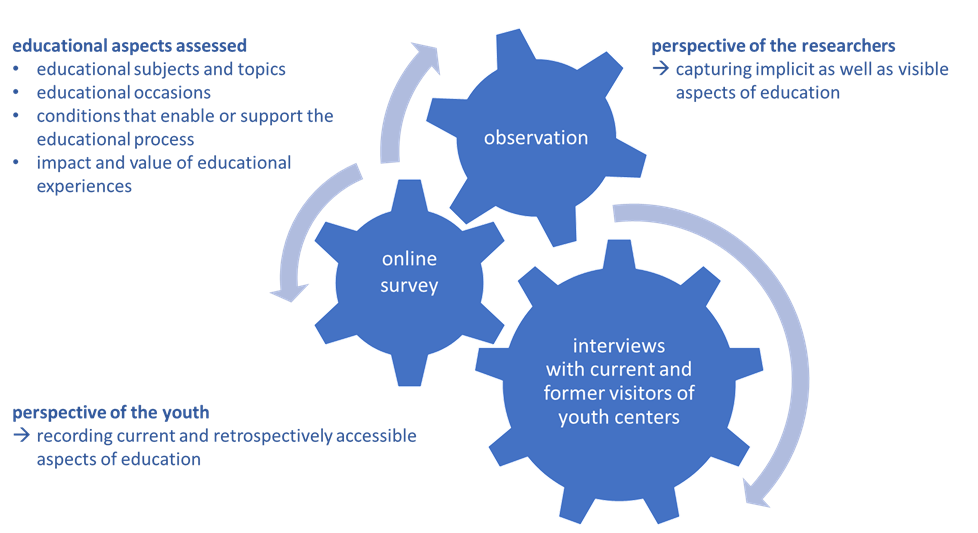
The results: Open youth work supports the self-education of young people in many ways
The insights into the interactions in the youth houses and the narratives of the young people have made it clear that open youth work enables diverse educational experiences that are often not perceivable at first glance.
Based on the data collected, a model of transformational education in open youth work can be derived, which can be used to describe educational experiences in the youth center. The model consists of three elements: initial situation (including educational subjects/topics and occasions), transformative educational process (supported by internal and internal factors) and impact of educational experiences and can be presented as follows:
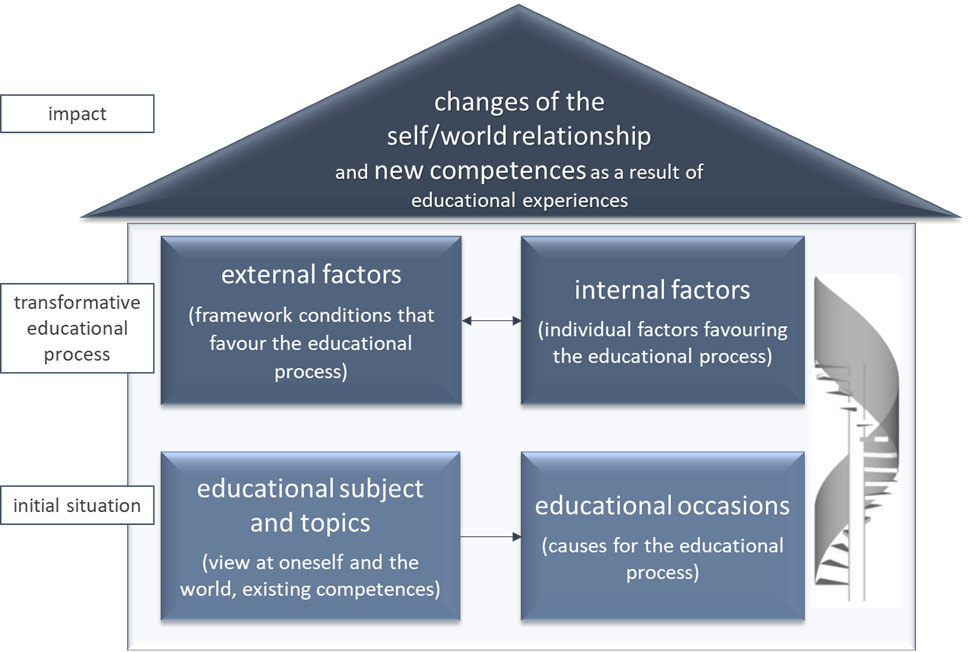
1. Where open youth work comes in: The occasions of educational experiences
Young people bring subjectively meaningful and biographically relevant educational subjects and topics to the youth center, such as family conflicts, challenges at school, questions of career orientation, relationship or factual issues.
Accordingly, educational occasions can be all life-world, biographical, developmental and socialisation-related questions and challenges that surround growing up.
Young people often perceive such questions as minor or major “crises” that they have not (yet) learned to cope with. These situations therefore require new ways of perceiving, interpreting and coping (Koller, 2018).
Open youth work, which is oriented towards the life world and the individual situation of young people, understands these crises as occasions for education and thus as starting points for processes of change.
2. How processes of education and change emerge: experiencing and processing new things about oneself and the world
In open youth work, young people find a secure space in which they can have a variety of new experiences for their personal development.
They are supported in developing new ways of seeing and thinking as well as their own points of view, in thinking about themselves and the world, and also in trying things out in the company of other young people and getting to know new sides of themselves. Many such situations of change can be identified from the empirical data.
The data also point to conducive framework conditions as well as typical approaches and ways of working in youth work that can be used to promote educational and change processes among young people:
- a community that is based on recognition and appreciation,
- an atmosphere in which the young people feel comfortable,
- an attitude of the educators towards the young people and their pedagogical actions,
- a fundamental acceptance of “weaknesses” that allows space for non-judgemental experimentation,
- a diverse pedagogical offer,
- a participatory approach that gives young people the opportunity to be active themselves, and
- the freedom to learn along their own needs.
Besides these conditions and factors resulting from youth work, there are also “internal” preconditions on the part of the young people, without which processes of change are hardly possible. For education, the acquisition of new things and the change of one’s relationship to oneself and to the world are self-active and individual processes. They require from the young person:
- the willingness and motivation to engage in new things,
- the desire for change and development,
- individual predispositions such as curiosity, motivation and openness to the unknown and unfamiliar,
- a basic willingness to reflect on oneself and to communicate with others, and
- confidence in one’s ability to develop and acquire the world.
Through its supportive framework conditions, open youth work makes it easier for young people to be able to form these internal conditions that enable educational processes in the end.
3. What education-oriented youth work does for young people: change and development for oneself
Educational experiences in open youth work cause young people to a) change their relationship to the world and themselves, b) develop existing skills and c) acquire new skills.
- Young people who have had educational experiences in the youth center question and change previous positions, attitudes and routines. In doing so, they rearrange their previous interpretations and attitudes towards themselves and the world. They broaden their perspectives and their horizons of experience in the conversations with others and through the interactions. This makes them more confident in dealing with their own problems, issues and challenges and strengthens their resilience. They also gain important experiences of self-efficacy.
- Through the lasting support of the professionals, the young people learn to see and pursue their own goals and interests more clearly, to stand up for themselves and to consistently follow their own path.
- In the youth center, the young people gain and develop a variety of competences with which they increase their ability to act in different situations. This happens in a playful way as well as through social learning forms or specific project work. The range of possibilities is wide and offers something suitable for all young people.
This multi-faceted self-education enables young people to competently cope with new tasks and challenges and to lead a self-determined and self-responsible life.

Value of the study
The study was able to answer the question of how open youth work works and how young people benefit from it from the perspective of youth. In addition, its complementary methodological approach has met demands to design youth work in an evidence-based way, i.e. to focus on the actual needs and circumstances of young people.
It has been made clear that open youth work makes an important contribution to the education of young people, whereby the understanding of education is broad. While school education can be understood primarily as the imparting of knowledge, youth work has a holistic understanding of education that focuses on the development of self-determined ability to act.
In this way, the study also provides a contribution to the validation and recognition of non-formal education. With the awareness of the value, the strengths and the potential of open youth work, its self-image and that of the professionals working there can also be strengthened.
What is to be done to make youth work successful?
The following recommendations can be concluded from the results of the study:
Empowering young people for participation and emancipation
In open youth work, supporting young people in their social and professional integration plays a role, but even more their emancipation: The goal and central task of subject-oriented youth work should therefore be to integrate young people into a society that they themselves can help to shape. To do so, youth work must enable them and support them in locating themselves in society as independent, mature, self-confident people.
Investing in Open Youth Work
In order to enable that as many young people as possible in Luxembourg benefit from it in the long term, education-oriented open youth work should be further expanded and strengthened. A good personal, financial and infrastructural resourcing of the facilities is important for this. In regard to the outstanding importance of pedagogical action and pedagogical competence, investments in the personnel structure and the training and further education of professionals also appear to be extremely sensible.
Initiate partnership between formal and non-formal education areas
Youth work is multi-faceted and means more than “non-formal education” or “out-of-school education”. Rather, the formal acquisition of knowledge in school and the non-formal and informal educational opportunities in youth work should be more closely interlinked in order to put education on a more holistic basis. Such a partnership at eye level would ultimately be beneficial to the young people.
Strengthening open youth work as a relevant educational actor
Considering the positive results of the study, the importance of open youth work as a valuable educational actor for the young generation should be emphasized even more. For this purpose, it is important to make the value and the offer of open youth work more accessible to the public, e.g. through an image campaign.
Literature
Biewers, S.; Latz, A.; Weis, D.; Samuel, R. (2022): Bildungserfahrungen in non-formalen Settings. Eine Jugendstudie über das Potenzial und den Wert bildungsorientierter Jugendarbeit. Esch/Alzette: Université du Luxembourg.
Honneth, A. (2003): Kampf um Anerkennung. Zur moralischen Grammatik sozialer Konflikte. Frankfurt a.M.: Suhrkamp.
Koller, H.-C. (2018): Bildung anders denken. Einführung in die Theorie transformatorischer Bildungs-prozesse. Stuttgart: Kohlhammer.
MENJE & SNJ (2021): Nationaler Rahmenplan zur non-formalen Bildung im Kindes- und Jugendalter. Luxemburg.
Scherr, A. (2021): Subjektorientierte Offene Kinder- und Jugendarbeit. In U. Deinet, B. Sturzenhecker, & L. &. von Schwanenflügel, Handbuch Offene Kinder- und Jugendarbeit (pp. 639-652). Wiesbaden: Springer VS.
Stojanov, K. (2006): Bildung und Anerkennung. Soziale Voraussetzungen von Selbst-Entwicklung und Welt-Erschließung. Wiesbaden: VS Verlag.


